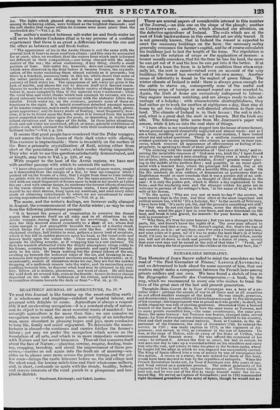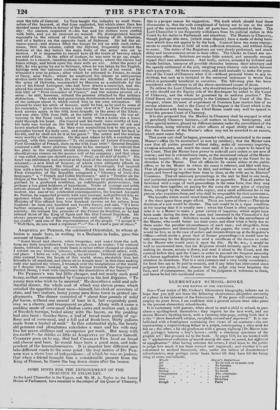REMARKABLE BIOGRAPHY.
THE Memoirs of JOHN SHIPP called to mind the anecdotes we had read of "the First Grenadier of France," LATOUR &AUVERGNE ; and we determined to look about for some account of him, that our readers might make a comparison between the French hero among private soldiers and our own. We have found a sketch of him in the Biographie Nouvelle des Contemporains ;—a book, by the way, which we recommend to every one who wishes to trace the lives of the great men of the last and present generation.
Theophile-Malo-Corret de la Tour d'Auvergne was a hero of a pe- culiar order : perhaps the annals of war in all times and in all countries do not afford another example of the kind. He was simple, generous, and disinterested; the sensibility of his feel ings was equal to the daringness of his courage ; his temperament was as proud as it was gentle; in short, his noble character was full of sterling greatness. Descended from a bastard branch of the house of Bouillon, he bore the same name as Turenne, and in many points resembled him,—the same countenance, the same pru- dence, the same bravery : but Turenne was beaten, changed sides, served Spain ; La Tour d'Auvergne was always conqueror, faithful to his country, lived and died under the national banners. Born at Cashiax, in the de- partment of the Finisterre, the 23rd of November 1743, he entered the service in 1767 ; was made captain in 1779, in the regiment of An- goumois ; and served, in 1782, as volunteer in the war of America. He was, at the siege of Mahon, aide-de .camp of the Duke of Crillon, who commanded the Spanish army. He was offered the command of his corps : he refused it. Always the first in onset, the last in retreat, he was seen one day to take up a wounded soldier on his shoulders and carry him into the rear, and return to take his place in the broken ranks, where he fought till the affair in which he was engaged was successfully carried. The King of Spain offered him a sum of money by way of recompense for this action. A crown or a statue, the sole reward for deeds of this kind, would have been decreed to him by the republics of antiquity. When the French Revolution broke out, La Tour d'Auvergne was fifty years of age, and lived retired on a moderate pension. The ardent generosity of his character led him to hail with rapture the promises of liberty which it held out, and he was one of the first to range himself under the trico- loured flag. He served as Captain of Grenadiers ; and in 1792 commanded eight thousand grenadiers of the army of Spain, though he would not ac-
cept the title of General. La Tour taught the infantry to avail them- selves of the bayonet, at that time neglected, but which since then has decided many battles in favour of the French. He exposed his life every day : the cannon respected it—his hat and his clothes were riddled with balls, and yet he received no wound. He distinguished himself especially in the retreat of Ustaritz, at the taking of St. Sebastian, and of a battery on the opposite bank of Bidassoa. He led the ad- vance-guard ; and always filled the troops he led on with such enthu- siasm, that this column, called the Infernal, frequently decided the fortune of the day before the main body of the army was set in motion. It is impossible to record here all the traits of bravery which are told of him. In the affair of Andaye, he was seen to go up, single- handed, to a church, standing alone in the country, where the enemy had taken refuge, and break open the door with an axe. After the peace of Bale, he was going by sea to Brittany, when he was taken by the English, fighting with the national cockade tied on the hilt of his sword. He remained a year in prison ; after which he returned to France, to reside at Passy, near Paris ; where he employed his leisure in antiquarian studies until the time when the war was rekindled. He then set out for the army of Helvetia, commanded by Massclna as a substitute for the son of his friend Lebrigant, who had been drawn a conscript, and dis- played his usual valour. It was at this time that he received the honour- able title of " First Grenadier of France," and the solemn present of a sabre : he still, however, refused the pension attached to this military distinction. This noble and persevering disinterestedness had something of the antique about it, which raised him in his own estimation. He refused to wear his sabre of honour, until he had, as he said to some of his comrades, " given the enemy a near view of it." La Tour d'Auvergne took service again in the Stith dead-brigade, in the army of the Rhine ; and was slain 27th June 1800, at the battle of Neubourg. He was ad- vancing in the front rank, sword in hand, when a hulas ran a lance right through his heart. His funeral and his tomb were worthy of him ; his body was buried on the field of honour, and branches of oak and laurel marked the place. As they were committing him to the grave, a grenadier turned his body over, and said—" he never turned his back in his life, and he shall not do it in his grave." The orator and the oration were worthy of the occasion. On the spot where he fell, a cenotaph was erected, with this inscription—" To the memory of Latour d'Auvergne, First Grenadier of France, slain on the 27th June 1800." General Dessoles rendered a still more glorious homage to his memory : he ordered that his place in the regiment should remain vacant, and that his name
should always remain on the muster-roll of his company ; and that when it was called, some one should answer, "Dead, on the field of battle." His
heart was embalmed, and carried at the head of the regiment by the first sergeant;—a new kind of honour, of which even antiquity affords no example. Lebriquant, the friend of Latour d'Auvergne, had inspired him with a taste for Celtic antiquities. During his abode at Passy, the First Grenadier of the Republic composed a " Glossary of forty-five languages," a " French and Celtic Dictionary," and a "Treatise on the Origin igin of the Gauls." This last work, the only one he published, is distin- guished by a profound erudition, an indefatigable perseverance, but perhaps a too great boldness of hypothesis. Traits of courage and noble actions abound in the life of this extraordinary man. Disinterested and modest, like one of his celebrated contemporaries, the learned Anquetil du Perron, he supported poverty with rare courage, and preferred itto an opulence which might have corrupted the simplicity of his life. The Minister of War offered him four hundred crowns on his return from England : he took one hundred and twenty francs, and said, " If I have further occasion, I will come again." He carried into camp a Spartan sobriety. He refused the presents of the Prince du Bouillon, as he had refused those of the King of Spain and the first Consul Napoleon. He always preserved his republican frankness and dignity. " I offer you' my credit," said one of the representatives of the people. " I accept it." ' " Well then, do you want a regiment 7"—" No—I want a pair of shoes."
ANQUETIL DU PERRON, the celebrated Orientalist, to whom al- lusion is made here, in writing to a Brahmin in India, gave this account of himself- " Some bread and cheese, value twopence, and water from the well, form my daily nourishment. I have no fire, even in winter; I lie without sheets, without a bed ; my body linen is never either changed or cleaned. I subsist on my literary labours, without income, without salary, with- out place. I have no wife, no child, no servant. Destitute of property, alike exempt from the bonds of this world, alone, absolutely free, but friendly to all mankind, and above all to honest men : in this state making rude war against my senses, I triumph over the temptations of the world, or I despise them : looking up with fervour towards the Supreme and Perfect Being, I wait with impatience the dissolution of my frame." Du PERRON'S was but little cheaper, and not nearly such good living, as that recommended by CORBETT in his last Register, " To young men who wish to be married." He describes a solid and sub- stantial dinner, the whole cost of which was eleven pence, which satisfied the appetites of four men—himself, his clerk or secretary of state, and two visitors, being young men front town in genteel em- ployments. The dinner consisted of " about four pounds of solid fat oacon, without one morsel of lean in it, but exquisitely good, rosy as a cherry, and transparent as glass. Along with it came a pudding made of corn-meal (Indian corn) and mutton suet, a dish of Swedish turnips, boiled along with the bacon, as the pudding had also been : besides these, a loaf of bread made partly of rye- flour and of corn-meal, and a full pot of fresh beer, thirty gallons made from a bushel of malt." In this substantial style, the hearty old penman and ploughman calculates a man and his wife may live for seven shillings and sevenpence per week. But away with tea-tackli.!—he drinks as little as ANQUETIL nu PERRON himself. CORBETT goes on to say, that had CHARLES Fox lived on bread and cheese and beer, he would have been a great man, and inde- pendent of the boroughmongers. It is singular how different men take different roads to the same point : the real motive of Du PER- RON was a stern love of independence ; of which he was so jealous, that when a friend brought him a considerable present from the King of France, he threw the bag down stairs after the bearer.



















 Previous page
Previous page